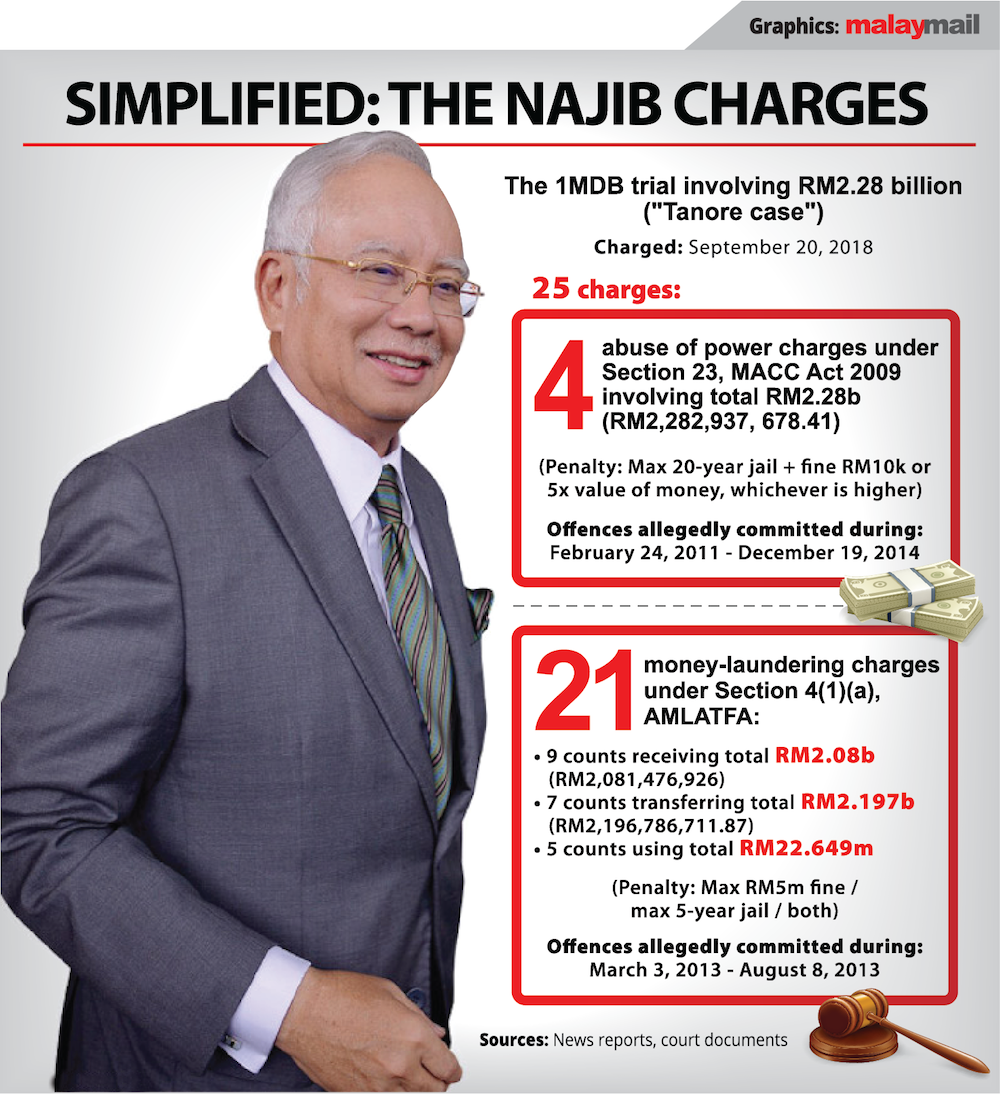KUALA LUMPUR, Nov 22 — The audio clip featuring Datuk Seri Najib Razak’s voice should not be admitted or accepted as evidence in the former prime minister’s 1Malaysia Development Berhad (1MDB) trial, as recordings that were obtained illegally by the Malaysian Anti-Corruption Commission (MACC) should not be admitted as court evidence, the defence argued today.
In this trial, Najib is facing 25 charges over his alleged power abuse and money laundering over 1MDB’s RM2.28 billion funds that were said to have entered his personal bank accounts.
While Najib’s lawyers have presented four purported letters from an alleged Saudi prince to claim that the funds which entered Najib’s accounts were donated by Saudi Arabia’s royalty, the prosecution had last week played the audio clip featuring a conversation between Najib and a United Arab Emirates royalty to rebut the “Arab donation” claim.
Najib’s lead defence lawyer Tan Sri Muhammad Shafee Abdullah today presented his arguments to the High Court on why the audio clip should not be admitted in court, saying that the MACC must comply with its own law under the Malaysian Anti-Corruption Commission (MACC) Act before it can produce evidence in court.
Citing the MACC Act, Shafee stressed that the MACC cannot obtain evidence illegally.
Previously, the prosecution had cited the MACC Act’s Section 41A to argue that the audio recording with Najib’s voice can be admitted in court, as Section 41A allows any document obtained by the MACC to be admissible in corruption cases in court “notwithstanding” or even if it goes against any other written law. The prosecution said audio recordings would also fall within the definition of “document”.
But Shafee said this Section 41A is a new provision that only became law in October 2018, while Najib’s alleged offences were said to be committed in the years 2011 to 2014, and said this meant Section 41A cannot be applied to his client’s case.
“The point I want to drive home is this, the amendment to this MACC Act by virtue of Section 41A came on October 1, 2018. Our contention is that it cannot be retrospectively applied,” he said.
Shafee said the MACC is required under Section 43 of the MACC Act to obtain authorisation before intercepting communications.
“They say we don’t care how these tape recordings came to be, even if it’s illegal, it doesn’t matter, under Section 41A, you have to admit. We say that’s a very simplistic way of looking at it, because Section 43 is not only about power but duty of the MACC, which says if you want to intercept, these are procedures you have to obey,” he said.
“Can the MACC simply tape conversations without obeying their law which is Section 43? They are the ones who drafted this, who provided this. They cannot come, it doesn’t matter under Section 43, but I got Section 41A, I can do anything illegal, the court will admit. I’m saying, Section 41A must be read under Section 43, that means you must comply with Section 43 and therefore any document obtained means obtained properly under Section 43,” he said.
Shafee also argued that Evidence Act requirements must still apply to this audio recording featuring Najib’s voice, where someone who was responsible for recording the evidence has to step forward and certify the matter.
Shafee said the prosecution had instead chosen to bring in the audio clip as evidence by having “a witness who has got nothing to do with the recording” — 42nd prosecution witness and former Treasury secretary-general Tan Sri Mohd Irwan Serigar Abdullah — identify the voice in the audio clip, saying this introduction of the recording is “without head nor tail”.
“This is putting the cart before the horse, ordinarily they would have to introduce ‘this is how it was recorded’. This is especially an issue which became a public controversy when Latheefa released, probably it’s the same recording, we are not sure,” he said, referring to then MACC chief Latheefa Koya’s public release of certain audio recordings in January 2020.
Among other things, Shafee also argued that Section 41A is inconsistent with the right to fair trial, right to privacy, and a right to equality of arms as covered under Article 5 and Article 8 of the Federal Constitution.
Tomorrow, Shafee is expected to present the final part of his arguments in objecting to the audio clip becoming evidence in the 1MDB trial, while lead prosecutor Datuk Seri Gopal Sri Ram is also expected to present his reply tomorrow.
Last week, Sri Ram had started playing an audio clip in court and showed the transcript, with 42nd prosecution witness Irwan identifying one of the voices there as sounding like Najib’s voice.
The voice identified as sounding like Najib had addressed the other individual as “Your Highness” and spoke about the need to resolve an impasse regarding 1MDB and IPIC which was alleged to be embarrassing to both Malaysia and the UAE, but the playing of the audio recording was interrupted by Shafee.
The High Court then started hearing arguments from both the prosecution and Najib’s legal team on whether the audio recording can be accepted in court as evidence.
The 1MDB trial before High Court judge Datuk Collin Lawrence Sequerah resumes this afternoon, with financial publication The Edge’s owner Tan Sri Tong Kooi Ong expected to resume his testimony as the 43rd prosecution witness.
The prosecution also indicated that it would have former Bank Negara Malaysia governor Tan Sri Zeti Akhtar Aziz on standby tomorrow as the next prosecution witness.
Earlier today, Najib’s younger brother and former CIMB Group chairman Tan Sri Nazir Razak was spotted in court today and was also seen chatting with Najib before hearing began this morning.























